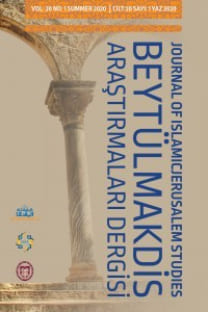Halife Ebubekir'in Beytülmakdis’in İlk İslamî Fethine Katkıları
Beytülmakdis'in Müslümanlar tarafından yedinci asırda gerçekleştirilen ilk fethi, Kutsal Topraklar için dikkat çekici bir dönüm noktasıydı. Asırlar süren dışlamanın sonunda Kutsal Topraklarda barış ve kucaklayıcılık nihayet kurulabilmişti. Onun da ötesinde bu tarihi olay, iki süpergücün, Bizans ve Persin arasında İslamın duruşunu da yükseltmekteydi. Bu önemli gelişme Ömer bin Hattabın zamanında gerçekleştiği için onun o önemli rolü ile ilgili bazı çalışmalar yapılmıştır. Ancak çok kısıtlı sayıda kaynak ilk İslam halifesi Ebubekir es-Sıddık'ın rolüne odaklanmaktadır. O halife seçilmesi ile beraber, sadece Medinede kurulan İslam devletini güçlendirmeye yönelik katkılar sağlamamız aynı zamanda Beytülmakdis'in özgürleştirilmesine / fethine de önemlı katkılar sağlamıştır. Erken dönem kaynaklar ve tarihi kayıtlar göstermiştir ki Halife Ebu Bekr, Hz Peygamberin Beytülmakdis'in fethine dair planını devam ettirmeye kararlıydı. Bu nedenle bu çalışmada, Hz Ebubekirin hilafeti boyunca Kutsal Toprakların fethinin zeminini hazırlamadaki katkıları incelenecektir. Bu katkılar, Usame Ordusunu yola çıkarması, yerel tehditleri güvence altına alması, Ridde Savaşları esnasında Müslümanları birleştirilmesi, Biladüşşama ordular göndermesi ve bunu öncelemesi, kendisinden sonraki halifesi aday göstermek suretiyle Kutsal Toprakların fetih planının devam etmesini garanti altına alması gibi hususları içerecektir. Bu çalışma sonucunda, Halife Ebu Bekirin katkılarının, vefatından sadece birkaç sene sonra onun halefi olan, Halife Ömerin devrinde Beytülmakdis'in ilk İslami fethine olanak sağladığı fikri desteklenmiştir.
Anahtar Kelimeler:
Beytülmakdis, Kutsal Topraklar, Ebubekir, Fetih, Strateji, Hz. Muhammed
The Contributions of Caliph Abu Bakr to the First Muslim Liberation of Islamicjerusalem
The first Muslim fath/ liberation of Islamicjerusalem in the seventh century was a remarkable historical turning point for the Holy Land. After centuries of exclusion, peace and inclusivity in Holy Land were finally established. Moreover, this historical event raised the standing of Islam between two superpowers, Byzantium and the Persia. As this vital event occurred in the era of ‘Umar Ibn al-Khattāb, several studies have documented his significant role. However, limited literature focuses on the role of his predecessor, the first Muslim Caliph, Abū Bakr al-Siddiq. Since his appointment as Caliph, Abū Bakr made crucial contributions not only to strengthen the foundation of the Islamic State in Madinah but also to liberate Islamicjerusalem. Investigation and analysis based on primary sources and historical records show that Caliph Abū Bakr was determined to continue the Prophet's plan to liberate Bayt al-Maqdis. Therefore, this study examined Caliph Abū Bakr’s contributions during his reign in paving the way for the liberation of the Holy Land. His significant contributions included sending out ’Usamah’s army, securing domestic threats and uniting Muslims during the Apostates War, prioritising and directing armies to al-Sham, and even the selection of his successor, all of which has contributed to the liberation of Bayt al-Maqdis. The result of this study supports the view that Caliph Abū Bakr's contributions enabled the first Muslim liberation of Islamicjerusalem to be achieved merely a few years after his demise, during the reign of his successor, ‘Umar Ibn al-Khattāb.
Keywords:
Bayt al-Maqdis, Prophet Muhammad, Abu Bakr, Fath, Holy Land, Strategy,
___
- Abu Dawud, S. (2008). Sunan Abu Dawud. Riyadh: Darussalam Publishers.
- Abu-Munshar, M. Y. (2013). Islamic Jerusalem and its Christians: A History of Tolerance and Tensions. London & New York: I.B. Tauris Publishers.
- Al-Azdi, M. (1853). Kitab Futuh al-Sham. Calcutta: Baptist Mission Press.
- Al-Ashqar, U. J. (2010). Mawsu’at al-Sahabah ‘ala Ard Filistin. Damascus: Mu’assasah Filistin Lil-Thaqafah.
- Al-Baladhuri, A. (2015). Futuh al-Buldan. Jakarta: Pustaka Al-Kautsar.
- Al-Bukhari, M. I. I. (1997). The Translation of the Meanings of Sahih Al-Bukhari. Riyadh: Darussalam Publishers.
- El-Awaisi, A. F. (2005). Introducing Islamicjerusalem. Dundee: ALMI Press.
- El-Awaisi, K. (2007). Mapping Islamicjerusalem. Dundee: ALMI Press.
- El-Awaisi, K. (2015). The Quranic Prophecy of the Defeat and Victory of the Byzantines. Journal of Islamicjerusalem Studies, 15, 1-32.
- Genequand, D. (2014). The Rise of Islam and the Conquest of Bilad al-Sham. In M. Ababsa (Ed.), Atlas of Jordan (pp. 168–169). Beirut: Presses de l’Ifpo.
- Haikal, M. H. (2015). Al-Fāruq ’Umar (A. A, Ed.). Jakarta: Tintamas Indonesia.
- Al-Hamawi, Y. (1995). Mu’jam al-Buldān. Beirut: Dār sadir.
- Ibn al-Murajjā. (1995). Faḍā’il Bayt al-Maqdis wal-Khalīl wa-Faḍā’il al-Sham (O. Livne-Kafri, Ed.). Shfaram: Al-Mashreq Ltd.
- Ibn Athīr, A. (1997). Al-Kamil fi al-Tarikh. Beirut: Dar al-Kitab al-Arabi.
- Ibn Hisham, A. (2019). Sirah Nabawiyah. Jakarta: Qisthi Press.
- Ibn Kathir, I. (2003). Al Bidayah Wal-Nihayah. Riyadh: Dar ‘Alam al-Kitab.
- Ibn Kathir, I. (2004). Al Bidayah Wan Nihayah. Jakarta: Darul Haq.
- Ibn Majah, M. I. Y. (2007). English Translation of Sunan Ibn Majah. Riyadh: Darussalam Publishers.
- Jabnoun, N. (2012). Islam and Management. Riyadh: International Islamic Publishing House.
- Kaka Khel, M. N. (1985). Succession to Rule in Early Islam. Islamic Studies, 24(1), 13–28.
- Madihah, A. (2020). The Implementations of Aman (Peaceful Coexistence and Mutual Respect) Theory and Model in First Muslim Fatih of Islamicjerusalem. Unpublished Master Thesis, Social Sciences University of Ankara.
- Al-Mubarakpuri, S. R. (2002). The Sealed Nectar: Biography of the Noble Prophet. Riyadh: Darussalam Publishers.
- Omar, A. (2006). Towards the Conquest of Islamicjerusalem: The Three Main Practical Steps taken by Prophet Muhammad. Journal of Islamicjerusalem Studies, vol.7, 55–100.
- Omar, A. (2008). The Preparation and Strategic Plan of the Prophet Muhammad for Islamicjerusalem. Unpublished PhD thesis, University of Aberdeen.
- Al-Sallabi, A. M. (2007). The Biography of Abu Bakr As-Siddeeq. Riyadh: Darussalam Publishers.
- Al-Suyuti, A. (1995). The History of the Khalifahs (3rd Revise). London: Ta-Ha Publisher Ltd.
- Al-Tabari, I. J. (1990). The History of al-Tabari Vol.9: The Last Years of The Prophet. New York: State University of New York Press.
- Al-Tabari, I. J. (1993a). The History of al-Tabari Vol.10: The Conquest of Arabia. New York: State University of New York Press.
- Al-Tabari, I. J. (1993b). The History of al-Tabari Vol.11: The Challenge to The Empires. New York: State University of New York Press.
- Al-Wāqidi, A. I. (2011). Kitāb al-Maghāzī (R. Faizer, Ed.). New York: Routledge.
- Al-Wāqidi, A.-I. (2005). The Islamic Conquest of Syria. London: Ta-Ha Publisher Ltd.
- ISSN: 1367-1936
- Yayın Aralığı: Yılda 2 Sayı
- Başlangıç: 1997
- Yayıncı: Beytülmakdis Çalışmaları Vakfı
